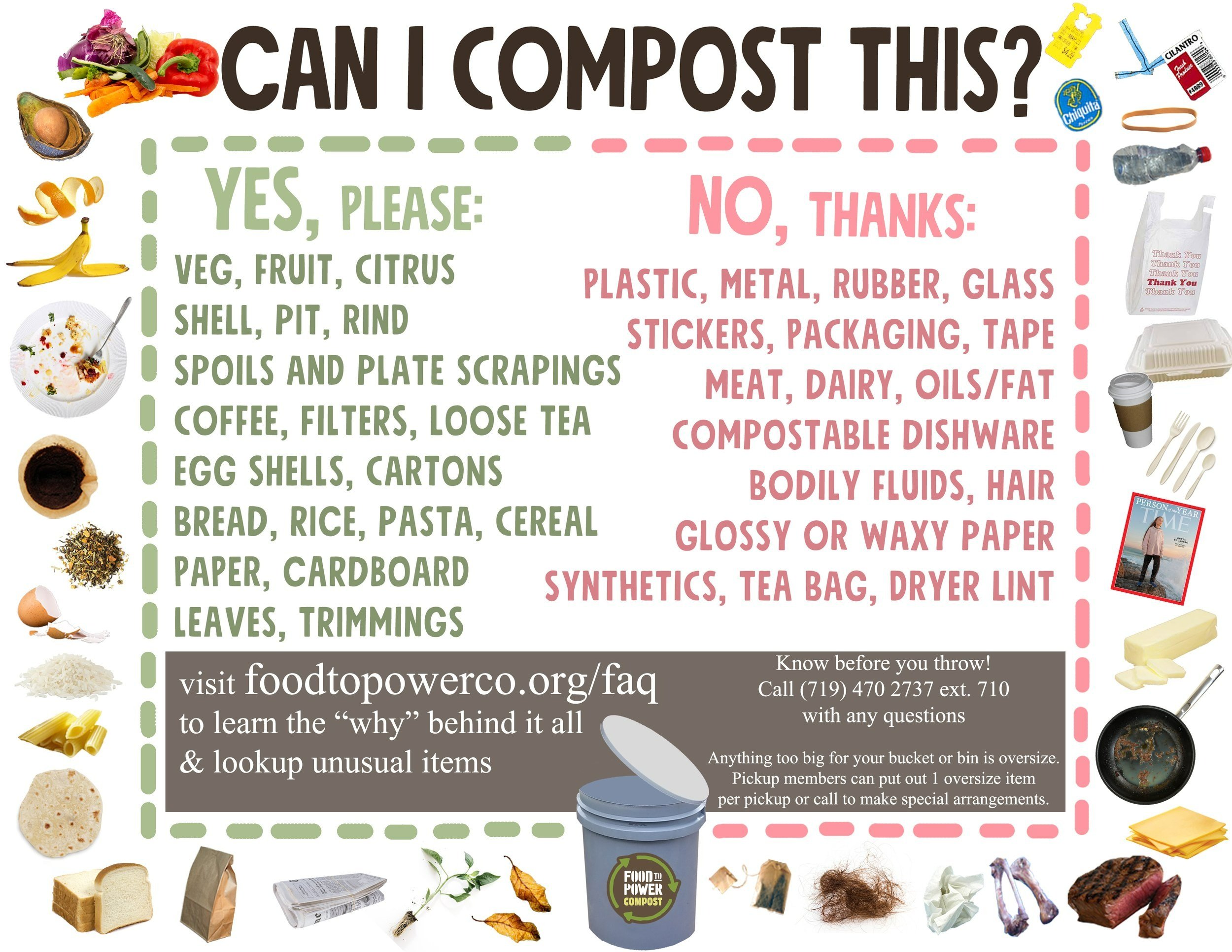Frequently Asked Questions
What materials do you accept for composting?
+ Learn more about Accepted Materials
The above graphic lists the most common materials that we do and don’t accept. A laminated version is available to all members, so you can reference it easily in the kitchen. Reach out to compost@foodtopowerco.org if you need a replacement or if you have any questions about accepted materials. Be aware that while fats, dairy and meat technically are compostable; they're not accepted on at our compost site at the Hillside Hub or at Don's Garden Center, where our residential food scraps get turned into compost. Trace amounts of fats, dairy and meat are OK, e.g., you can scrape leftovers from your caesar salad or soggy, milk-soaked cereal bits into your bin, but not a whole hunk of meat or any bones.
+ What about compostable products?
We don't accept compostable products from residential members. That means no compostable bags, dishware, cups, cutlery, etc. We no longer accept 3-gal compostable bags from residential members. We do line members' buckets with an 8-gal compostable bag that our staff later sorts out to the composting facility at Midway Landfill. Food scraps collected from residential members get composted on-site at the Hillside Hub or sent to Don's Garden Shop, which doesn't accept any harder-to-compost compostables. That's why Food To Power does not accept any compostable products from residential members.
After completing the commercial intake form and with permission from FTP Compost staff, commercial clients may choose to include harder-to-compost items like compostable products, meat, dairy, oils, etc. which are then sent to the composting facility at Midway Landfill, where harder-to-compost compostables are accepted.
+ Where do my food scraps go?
Compostables collected from residential pickups and dropoffs gets routed two ways: some stays on-site at the Hillside Hub where FTP Compost staff make small batches of high-quality compost and some goes to Don's Garden Shop, a local landscape supply and commercial composter off Platte. Compostables collected from commercial clients that include harder-to-compost items get sent to the composting facility at Midway Landfill.
Don's supplies compost to local landscapers, gardeners and farmers. Midway's compost gets used by bigger institutions, like transportation agencies, golf courses, campuses, and for land reclamation on-site. Our in-house compost gets used to make compost extracts and teas. The compost we give back to members twice a year is Don's compost that's been cured, watered and inoculated with our compost extracts.
+ What is composting?
Composting is the managed decomposition of food and other organic waste. It’s an age-old conservation practice done on the scale of households, metro regions and everything in between. Generally, composting entails the mixing of nitrogen-rich materials (often called “greens”) with carbon-rich materials (often called “brown”) at a carbon:nitrogen ratio between 2:1 and 3:1 by volume. With enough water, oxygen and time, a compost pile will start to “cook” — meaning, billions of soil microorganisms start to digest the waste materials, exuding heat as a byproduct of their metabolism. Fully broken down, the pile will cool off and start to both look and smell like the kind of dark, crumbly soil you might find in a forest. Finished compost has many applications in horticulture, agriculture, landscaping, remediation and infrastructure, generally benefitting soils’ water-holding capacity, carbon content, nutrient availability and diversity of beneficial microbiology.
+ "Pay-what-you-can" — what's that mean?
Like any waste management business, we have operational costs and collect user fees to cover them. Unlike most businesses, everyone is welcome to participate regardless of ability to pay. That's why our services are priced on a sliding scale: so that those with economic privileges (like earning a high income, owning property, having investments, etc.) are invited to pay more while those with economic barriers (like being un- or underemployed, carrying debts, caretaking for others, etc.) are invited to pay less. Only you know your situation; just be realistic and pick the price that feels right for you. Change anytime by submitting a message through your account dashboard.
If it's not possible to contribute financially, that's OK! — email to compost@foodtopowerco.org to bypass payment.
+ How should I collect food scraps?
To collect food scraps while cooking or after a meal, we recommend using whatever you have on-hand (e.g. tupper ware, bowl, salad container, oatmeal canister, popcorn tin, protein powder container, cut the top off a milk carton, get creative!) There are also plenty of options on the market that have cool features such as carbon filters to eliminate odors or that hook on to cabinets to allow for easy scraping into the vessel. Consider storing your food scraps in the freezer between uses to stall decomposition. (Leaving food scraps out and uncovered can attract fruit flies in the warmer months.) Keep your bucket lid sealed between use.
For pickup members: make sure all your scraps get into your bucket and your bucket gets outside by your scheduled pickup day. (You can opt in/out of pickup reminders, by email and/or text, via your account dashboard.)
For dropoff members: take your container as-is or transfer its contents to something more portable when you make a trip to your dropoff station. Paper bags can go into the bins, but no compostable bags or anything inorganic you might be using to collect or transport your scraps (like, a plastic container) should not.
+ Should I line my basket/bucket?
No! Residential pickup members - our drivers will line your buckets with an 8-gal compostable bag. Dropoff members - using a paper bag is fine, but the easiest way to keep your container clean is to wash it.
+ What about trash/recycling? What's the best option?
There's more than 12 private companies offering trash and recycling services in Colorado Springs. Most of them are big corporations that care more about stock prices than they care about the health of our communities. We recommend choosing an independent, locally-owned business for your trash and recycling needs, such as SoCo Waste

